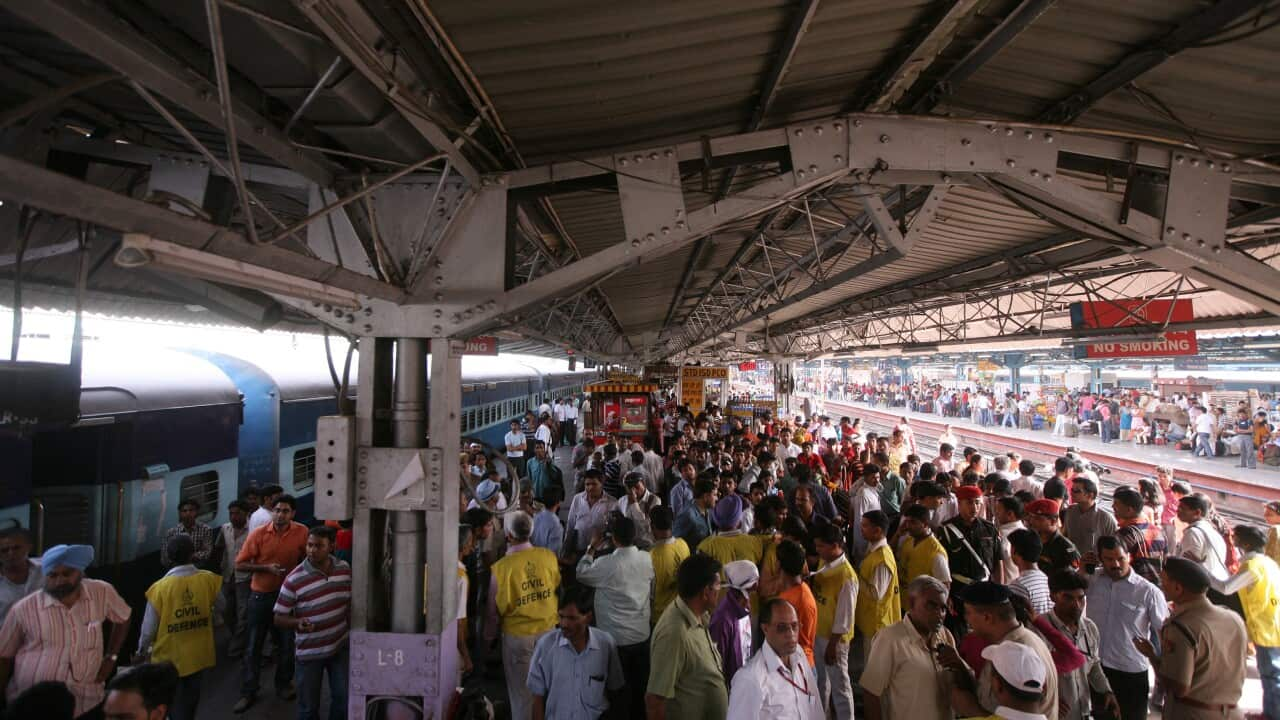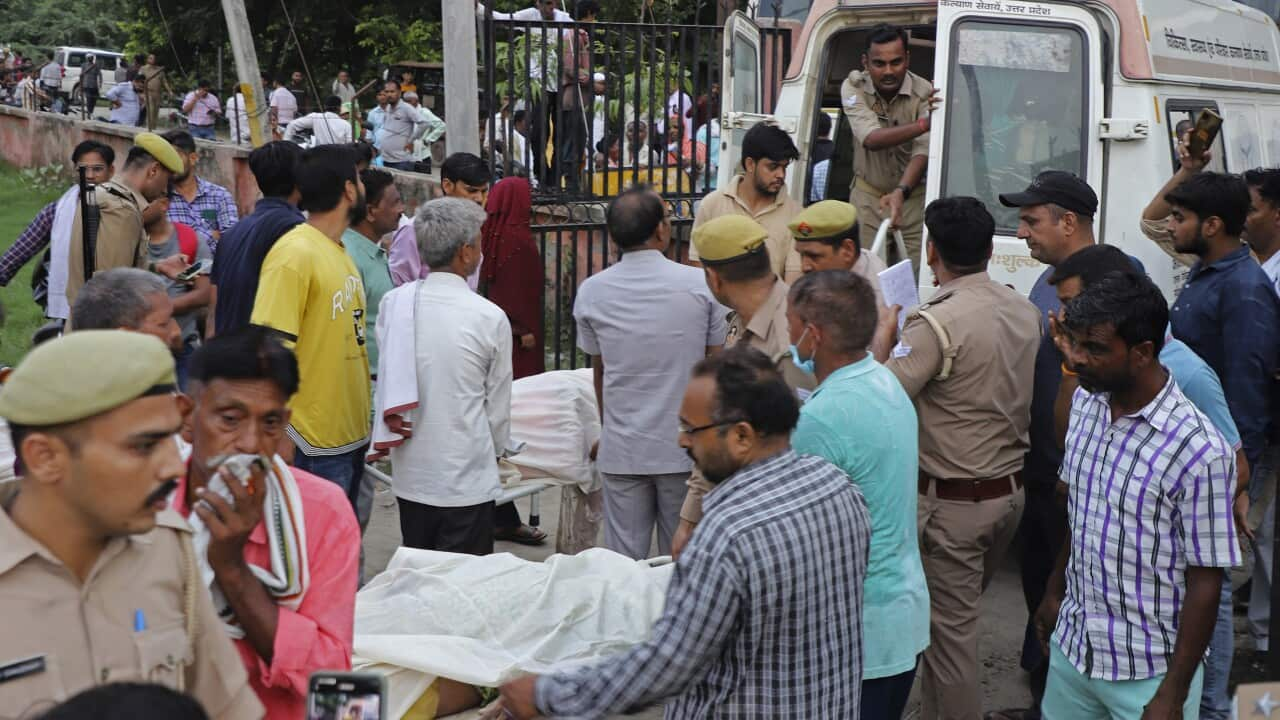A crowd crush incident in India has claimed the lives of at least 116 people at a Hindu religious event in the northern state of Uttar Pradesh.
India has a long history of such deadly episodes, as people gather in huge numbers to attend religious, cultural and political events, or even while trying to catch the train during rush hour.
Here are some of the most notable throughout the country's history.
February 1954
During one of the holiest Hindu religious festivals, the Kumbh Mela, which occurs once every 12 years, an estimated 350-800 pilgrims lost their lives at Prayagraj (then known as Allahabad), according to news reports that were published in The Guardian and Time. Hundreds were counted missing and over 2,000 injured.
Located in the north Indian state of Uttar Pradesh, Prayagraj is amongst the holiest cities for the Hindu community.
November 1994
On 23 November 1994 in Nagpur, some 800km from Mumbai in western India, 114 members of the Gowari community were killed and 500 more injured as the police tried to control and disperse nearly 50,000 protesters who were trying to enter the state assembly to make political demands.
January 1999
At least 52 people reportedly died in a crowd crush that occurred at the Sabarimala Temple in Kerala in southern India. They had gathered to celebrate the annual Makara Jyothi festival.
A landslide occurred when some 200,000 male Hindu pilgrims congregated around a holy site on a sacred hill, which then collapsed.

April 2004
The BBC reported that in the north Indian state of Uttar Pradesh, 21 women died as they rushed to grab free saris that were handed out during a politician's birthday celebration rally in the city of Lucknow.
A crush occurred among a crowd of supporters of the ruling party who had gathered in a park to participate in the birthday rally of Lalji Tandon, the then-state leader of the Bharatiya Janata Party.
January 2005
Over 265 Hindu devotees were killed and hundreds more suffered injuries in a crowd crush at the Mandhardevi temple in Wai, some 250km from Mumbai. The incident was caused by slippery steps leading up to the temple.
August 2008
Nearly 145 Hindu pilgrims died at the Naina Devi temple in the Himalayan state of Himachal Pradesh when rumours of a landslide triggered a rush of people.
September 2008
Some 250 people lost their lives in a crowd crush at the Chamunda Devi temple near Jodhpur in Rajasthan where pilgrims had congregated to celebrate Navratri, a nine-day festival that celebrates the goddess Durga and leads up to the annual festival of Diwali.
March 2010
At least 63 people, more than half of them children, were killed in a crowd crush triggered by a massive rush at a Hindu temple in the northern Indian state of Uttar Pradesh after people gathered to collect free food and clothes at the site, according to local media.
February 2013
At least 36 Hindu pilgrims died in a crowd crush again during the Kumbh Mela (on the busiest day) in Prayagraj, Uttar Pradesh.
This festival attracts over 100 million pilgrims over the course of two months.

Many millions of people make the Kumbh Mela pilgrimage. Source: Getty / Robert Nickelsberg
November 2013
Around 115 people were killed and more than a hundred suffered injuries due to a crowd crush at the Ratangarh temple in the central Indian state of Madhya Pradesh. More than 150,000 people had gathered to celebrate Navratri.
October 2014
At least 32 people died in an incident during the Dussehra celebrations in the eastern Indian city of Patna.
They had gathered at an outdoor venue to celebrate this festival in which effigies of demons are burnt which later burst into fireworks. Dussehra marks the end of the nine-day festival of Navratri and leads up to Diwali.
July 2015
Thousands of pilgrims had gathered along the banks of the Godavari river in south India to mark the festival of Godavari Pushkaram, which occurs once every 144 years.
A massive crush was triggered when the crowd tried to retrieve their shoes after taking a holy bath in the river. At least 27 died and dozens were injured.
October 2016
At least 24 people were killed and 20 injured when they were crossing a crowded bridge to attend a ceremony at a religious guru's commune on the outskirts of Varanasi in Uttar Pradesh.
The organisers had reportedly expected around 3,000 devotees at the ceremony, but more than 70,000 turned up.

A crush on a crowded pedestrian bridge in Mumbai in 2017 killed 22 people. Source: Getty / Bhushan Koyande/Hindustan Times
September 2017
A crowd crush on a crowded pedestrian bridge connecting two train stations in India's financial capital, Mumbai, claimed the lives of 22 people and injured 32 during the morning rush hour on 29 September.
Some commuters reportedly climbed over the bridge's railing while others got trampled.
January 2022
As a large crowd of devotees tried to push through to enter the Vaishno Devi temple in Jammu and Kashmir, at least 12 people died and more were injured.
Numbers of people killed are estimates only. Sourced via Reuters, AP, The Guardian, Time, India Today, BBC.










